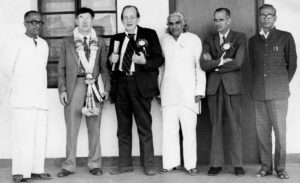FROM ARYABHATA TO BOSE...
Mathematics is a subject that has been studied and developed by many civilizations throughout history. One of the most significant contributors to the field of mathematics in India. Numerous fields of mathematics, including algebra, arithmetic, trigonometry, and the study of negative numbers, were greatly advanced by ancient Indian mathematicians. Most significantly, India is where the decimal system that we use today first appeared.
Between 1000 B.C. and 1000 A.D., various treatises on mathematics were authored by Indian mathematicians in which were set forth for the first time, the concept of zero, the techniques of algebra and algorithm, square root, and cube root.
The mathematically advanced culture that was thriving on the subcontinent at the same time when Europe was still locked in the middle ages may be seen in the leap made in India that turned zero from a mere placeholder to a number.
In the words of the Australian indologist A.L. Basham, “The world owes most to India in the realm of mathematics, which was developed in the Gupta period to a stage more advanced than that reached by any other nation of antiquity”.
A fascinating fusion of the familiar and the bizarre can be found in classical Indian mathematics. For the modern individual, Indian mathematical treatises were written in verse form, and they generally do not share modern mathematics’ concern for rigorously structured formal proofs
What Would Have Happened If India’s Contributions to Mathematics Didn’t Exist?
The world would be significantly different now if India’s contributions to mathematics didn’t exist. We would not have the idea of zero or the decimal system that we use today. There would be no knowledge of the square root, cube root, or algebraic algorithms. Negative numbers and the study of arithmetic would not have been as developed as they are now.
The absence of these contributions would have had a significant impact on the development of science and technology. The decimal system is the foundation of modern science and technology, and without it, we would not have been able to make the progress that we have made in fields such as physics, chemistry, and engineering. The concept of zero is also essential in many areas of science and technology, including computer science, where it is used in binary code.
In conclusion, India’s contributions to mathematics have been significant and far-reaching. They have had a profound impact on the development of science and technology, and without them, the world would be a very different place. The decimal system, the concept of zero, and the techniques of algebra and algorithm, square root, and cube root are just a few of the contributions that have made India a major player in mathematics.
